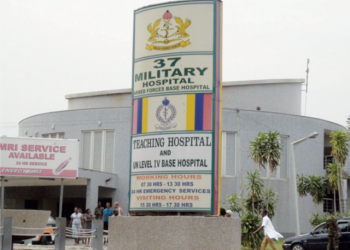
The author, Dominic Senayah.
This article examines the rationale behind welfare and benefits systems in Global North countries and the mechanisms that have sustained them over the decades. It explores Ghana’s current socioeconomic realities, especially in light of the COVID-19 pandemic and subsequent economic downturn, to argue the need for an effective welfare system in the country. The discussion acknowledges challenges, including corruption, nepotism, and fiscal constraints, that historically have impeded Ghana’s development and proposes strategic governance and policy reforms to build a sustainable welfare model. The aim is to inform policymakers, academics, and stakeholders committed to equitable social protection in Ghana.
Introduction
Welfare and benefits systems constitute foundational pillars of social protection in many nations, particularly in the Global North. These systems provide crucial buffers against life’s adversities, including unemployment, health crises, old age, and poverty, thereby fostering social stability and economic resilience (Esping-Andersen, 1990). Countries in the Global North have developed long-standing welfare regimes supported by mature institutions, progressive tax systems, and accountable governance frameworks (Kreitzer et al., 2009).
By contrast, many nations in the Global South, including Ghana, have struggled to develop comparable welfare frameworks due to complex historical trajectories, political instabilities, and structural developmental challenges (Gough & Wood, 2004). The COVID-19 pandemic crystallised worldwide the critical necessity of social safety nets (World Bank, 2020). In Ghana, the pandemic revealed the fragility of existing social protections and highlighted the urgent need for more comprehensive welfare provisions capable of supporting vulnerable populations during crises (Kreitzer et al., 2009).
The Welfare Systems of the Global North: An Overview
Welfare states in countries such as the United States, United Kingdom, Germany, Sweden, and Canada evolved over decades through political consensus and economic growth, often originating in responses to industrialisation and social upheaval in the 19th and 20th centuries (Pierson, 1994). These systems encompass a broad spectrum of benefits, including healthcare services, unemployment insurance, pensions, child support, education subsidies, and social housing.
The financing of these welfare systems relies fundamentally on progressive taxation, including income tax, corporate tax, and value-added taxes, supported by relatively high levels of economic productivity (OECD, 2019). Furthermore, social insurance schemes, financed by contributions from employers and employees, constitute a large part of retirement pensions and unemployment insurance. This contributory model ensures redistribution that reduces inequality and promotes social cohesion (Wilensky, 1975).
Above all, these welfare frameworks depend on effective governance, characterised by transparency, regulatory oversight, and low corruption levels (Bardhan & Mookherjee, 2006). Institutions with checks and balances prevent misappropriation of funds, while regulatory frameworks safeguard equitable resource distribution. Sustained political commitment across electoral cycles has enabled these programmes to endure even through economic shocks and government changes (Leibfried, 1992).
Current Socioeconomic Context of Ghana
Ghana, classified as a lower-middle-income country in West Africa, has experienced notable democratic progress and economic reforms over recent decades (World Bank, 2023). Its economy—the sum of agriculture, mining, and a growing services sector provided promising growth trajectories pre-pandemic. However, significant structural issues remain, including income inequality, underemployment, and insufficient social protection coverage, especially for informal workers (International Labour Organisation, 2020).
The arrival of COVID-19 inflicted a severe economic shock. Lockdowns and public health measures disrupted informal-sector livelihoods, which represent a significant portion of Ghana’s workforce and lack access to formal social insurance (ILO, 2020). The consequent economic contraction diminished government revenues even as demand for health and social spending soared. Inflation rose amid currency depreciation, heightening poverty risks and exposing critical gaps in existing social welfare systems relied upon unevenly by vulnerable populations (World Bank, 2023).
Since then, ongoing inflation, supply chain interruptions, and global geopolitical tensions continue to strain fiscal stability. The pandemic underscored the imperative for Ghana to develop more resilient and comprehensive social protection systems.
The Imperative for a Welfare and Benefits System in Ghana
Given the present socioeconomic landscape, it is imperative that Ghana establishes a comprehensive welfare and benefits system. Such a system would provide a reliable safety net for vulnerable groups, significantly reducing poverty and inequality while enhancing the country’s economic resilience to shocks (Devereux & Sabates-Wheeler, 2004).
Social protection mitigates vulnerability by delivering income support and facilitating access to essential services, including healthcare, education, and housing (Barrientos, 2013). This role is paramount in Ghana, where many citizens live near the poverty threshold. Effective social protection enhances human capital development by reducing catastrophic health expenditures that drive households deeper into poverty (Wagstaff, 2002). Assurance of healthcare access without financial hardship encourages health and education investments, fostering a more productive workforce.
Similarly, education support programmes enhance literacy and skills development, equipping younger generations to contribute meaningfully to economic growth (UNESCO, 2014). Beyond direct benefits, well-designed welfare systems strengthen social cohesion by reducing disparities and fortifying social trust (Wilkinson & Pickett, 2010). Such solidarity is vital in Ghana’s multiethnic society, helping bridge divisions and reducing tensions.
Moreover, welfare spending acts as an economic stimulus, increasing household consumption and supporting local businesses (Marmot, 2010). Child allowances and unemployment benefits raise demand for goods and services, catalysing job creation and growth. During recessions, welfare programmes operate as automatic stabilisers, moderating economic downturn impacts (Baker, 2009). For Ghana, investing in social protection fosters a resilient economy capable of withstanding shocks and accelerating recovery.
Thus, establishing a welfare system in Ghana transcends social justice; it is a strategic imperative underpinning economic stability and national cohesion.
Challenges in Implementing Welfare Systems in Ghana
Despite clear benefits, several obstacles hinder Ghana’s development of sustainable welfare frameworks. Endemic governance issues such as corruption, nepotism, and misappropriation have compromised past resource mobilisation and programme delivery (Transparency International, 2021). These challenges erode public trust and impair service quality.
Corruption can lead to the exclusion of eligible beneficiaries and diversion of funds, reducing programme reach and efficacy. Patronage often results in biased allocations that deepen inequality. Furthermore, Ghana’s large informal economy complicates social insurance contributions, as irregular income streams hinder premium collection and enforcement (ILO, 2018). Limited administrative capacity also restricts the accurate targeting of vulnerable populations.
Finally, constrained fiscal space marked by rising debt burdens and competing priorities limits government capacity to finance expansive welfare programmes.
Lessons and Strategies for Ghana to Emulate Global North Systems
Ghana’s aspiration to develop welfare systems akin to those in the Global North requires adaptation to local contexts through a multifaceted strategy:
Strengthening Governance and Institutions: Make transparency and accountability central by reinforcing anti-corruption efforts with oversight bodies, digitising payments to reduce leakages, and robust auditing (World Bank, 2017). Legislation to curb nepotism and promote meritocracy within public service is vital. Empower civil society and media as watchdogs to maintain pressure against malpractices.
Expanding Tax Revenue and Formalising the Economy: Broaden the tax base through enhanced compliance and administration reforms while incentivising formalisation of small and medium enterprises (OECD, 2020). Innovative tax measures such as digital levies and progressive income tax can augment revenue, which must be transparently managed to reinforce public trust.
Designing Inclusive and Flexible Welfare Programmes: Blend contributory social insurance with non-contributory assistance schemes to reach vulnerable groups comprehensively (Devereux, 2016). Community-centred targeting and data-driven beneficiary identification can improve fairness and efficiency.
Leveraging Technology for Efficiency: Use digital platforms, especially mobile money, popular in Ghana, to deliver benefits securely and facilitate real-time monitoring that reduces fraud and expands access (GSMA, 2021).
Long-term Political Commitment and Social Dialogue: Build broad consensus and involve citizens, labour unions, and private sector stakeholders in welfare policy design and implementation to ensure continuity beyond electoral cycles and enhance programme legitimacy.
Conclusion
The welfare systems of the Global North offer invaluable lessons in building social protection programmes that promote equity, stability, and economic growth. Ghana stands at a pivotal moment where the COVID-19 pandemic and economic challenges have underscored the urgent need for an inclusive, efficient welfare and benefits system.
Although governance and fiscal constraints remain formidable, Ghana can establish a welfare state tailored to its context through transparency, institution-building, revenue mobilisation, inclusive programme design, technology integration, and steadfast political support.
Ultimately, developing a robust welfare system will not only provide a social safety net but also catalyse national development, reduce inequality, and improve the well-being of all Ghanaians.
References
- Baker, D. (2009). The Benefits of Social Security: A Review of the Evidence. Journal of Economic Perspectives, 23(4), 1-22.
- Bardhan, P., & Mookherjee, D. (2006). Decentralisation and Accountability in Developing Countries: A Comparative Perspective. MIT Press.
- Barrientos, A. (2013). Social Protection for the Poor and Poorest: Concepts, Policies and Politics. Palgrave Macmillan.
- Devereux, S. (2016). Social Protection for the Poorest: A Review of the Evidence. Institute of Development Studies.
- Devereux, S., & Sabates-Wheeler, R. (2004). Transformative Social Protection. Institute of Development Studies.
- Esping-Andersen, G. (1990). The Three Worlds of Welfare Capitalism. Princeton University Press.
- Gough, I., & Wood, G. (2004). Insecurity and Welfare Regimes in Asia, Africa, and Latin America: Social Policy in Development Contexts. Cambridge University Press.
- GSMA. (2021). The Role of Mobile Money in Social Protection. GSMA Report.
- International Labour Organisation. (2018). World Social Protection Report 2017-19: Universal Social Protection to Achieve the Sustainable Development Goals. ILO.
- International Labour Organisation. (2020). COVID-19 and the World of Work: Impact and Policy Responses. ILO.
- Kreitzer, T., et al. (2009). The Role of Social Protection in Economic Recovery: Lessons from the Global Financial Crisis. Social Protection and Labour Discussion Paper.
- Leibfried, S. (1992). Towards a European Welfare State? On Integrating Poverty Regimes into the European Community. In Social Policy in a Changing Europe* (pp. 245-280). *Palgrave Macmillan.
- Marmot, M. (2010). Fair Society, Healthy Lives: The Marmot Review. Strategic Review of Health Inequalities in England Post-2010.
- OECD. (2019). Society at a Glance 2019: OECD Social Indicators. OECD Publishing.
- OECD. (2020). Tax Policy Reforms 2020: OECD and Selected Partner Economies. OECD Publishing.
- Pierson, P. (1994). Dismantling the Welfare State? Reagan, Thatcher, and the Politics of Retrenchment. Cambridge University Press.
- Transparency International. (2021). Corruption Perceptions Index 2021. Transparency International.
- UNESCO. (2014). Teaching and Learning: Achieving Quality for All. EFA Global Monitoring Report.
- Wagstaff, A. (2002). Poverty and Health Sector Inequalities. Bulletin of the World Health Organization, 80(2), 97-105.
- Wilkinson, R., & Pickett, K. (2010). The Spirit Level: Why Equality is Better for Everyone. Penguin Books.
- World Bank. (2020). The World Bank’s Response to COVID-19 (Coronavirus). World Bank.
- World Bank. (2023). Ghana Economic Update: Navigating the Economic Crisis. World Bank.
About the Author
Dominic Senayah is an International Relations Researcher focusing on Trade, Migration, and Diplomacy. With experience in Business Development and Marketing Communications, he offers unique insights into global dynamics shaping policy and development discourse.
DISCLAIMER: The Views, Comments, Opinions, Contributions and Statements made by Readers and Contributors on this platform do not necessarily represent the views or policy of Multimedia Group Limited.
DISCLAIMER: The Views, Comments, Opinions, Contributions and Statements made by Readers and Contributors on this platform do not necessarily represent the views or policy of Multimedia Group Limited.
- President Commissions 36.5 Million Dollars Hospital In The Tain District
- You Will Not Go Free For Killing An Hard Working MP – Akufo-Addo To MP’s Killer
- I Will Lead You To Victory – Ato Forson Assures NDC Supporters
Visit Our Social Media for More




